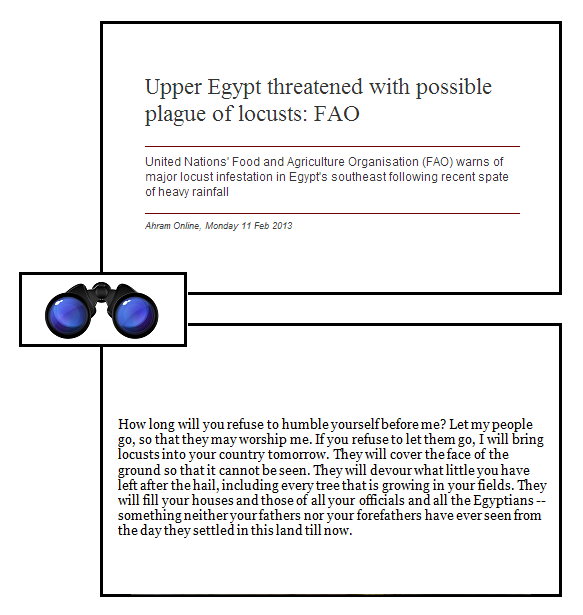Of plagues of locusts, then & now?
[ by Charles Cameron — the juxtaposition of sacred and secular worldviews, and what happens where they overlap ]
.
**
I’m returning here to an old theme of mine, the juxtaposition of worldviews — in this case, accounting for plagues of locusts in Egypt.
Such juxtapositions are like Rorschach blots in some ways — they allow each reader to see the items juxtaposed from within their own worldviews, perhaps applauding one and dismissing another, perhaps seeing some virtue in each or none in either — and perhaps arriving at some meta-level understanding which neither one alone would afford.
Is a plague of locusts in Upper Egypt of which the FAO warns in the upper panel above entirely explained in terms of rainfall? Is it pure mental happenstance that Egypt was the site of a Biblical locust plague at the time of the Israelite Exodus [Ex. 10. 3-6]? Is there, perhaps, a message for Egypt vis-a-vis Israel for our own day?
The answers people give to questions such as these, in which secular and sacred sources address what are putatively similar situations, can influence the way on which they voice themselves and vote — perhaps a good thing, perhaps not.
**
For what it’s worth, the plague of locusts is mentioned in the Qur’an in Sura 7.133:
So We let loose upon them [the Egyptians} the flood and the locusts, the lice and the frogs, the blood, distinct signs; but they waxed proud and were a sinful people.
**
In contemplating matters of this sort, it may be valuable to consider the remarks of the Pontifical Biblical Commission in The Interpretation Of The Bible In The Church, 1993/4:
The basic problem with fundamentalist interpretation of this kind is that, refusing to take into account the historical character of biblical revelation, it makes itself incapable of accepting the full truth of the incarnation itself. As regards relationships with God, fundamentalism seeks to escape any closeness of the divine and the human. It refuses to admit that the inspired word of God has been expressed in human language and that this word has been expressed, under divine inspiration, by human authors possessed of limited capacities and resources. For this reason, it tends to treat the biblical text as if it had been dictated word for word by the Spirit. It fails to recognize that the word of God has been formulated in language and expression conditioned by various periods. It pays no attention to the literary forms and to the human ways of thinking to be found in the biblical texts, many of which are the result of a process extending over long periods of time and bearing the mark of very diverse historical situations.




March 4th, 2013 at 4:23 pm
Joel Rosenberg, writer of apocalyptic thrillers and “biblical” interpretations of current events, just couldn’t resist, could he?
.
His blog today is headed:
and begins:
Rosenberg wants to have his cake and eat it — to avoid saying outright that these locust plagues are signs of the end times, and yet arouse his readers by suggesting it. Thus he quotes The Atlantic:
And yet his title — Mideast troubles take a Biblical twist — like his novels in both the Sunni-threat-based first series of apocalyptic thrillers, The Last Jihad, The Last Days, The Ezekiel Option, The Copper Scroll, and Dead Heat, and his more recent Shi’a-threat-based series, The Twelfth Imam, The Tehran Initiative and its final book, The Damascus Countdown (it comes out tomorrow) clearly aligns with the apocalyptic reading of current events that he also presents in non-fiction form in his talks, tours of Israel, and such books as Epicenter: Why The Current Rumblings In The Middle East Will Change Your Future.
.
Ooh, locusts! Think Moses, think Passover, think God’s wrath against Egypt on behalf of Israel — But put your apocalyptic fears to rest. This happens every year…
.
Ooh, and for good measure, nukes! Think Esther, think Purim, think God’s wrath against Iran on behalf of Israel…
.
And y’know, unlike the unbearably tedious and poorly written La Haye / Jenkins Left Behind series, I really enjoy reading Joel Rosenberg’s thrillers: I just think his versions of Islamic eschatology and its political implications are, shall we say, confused.